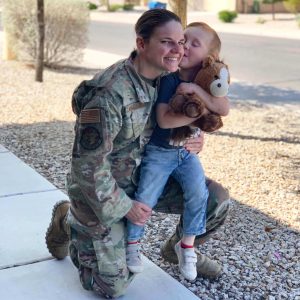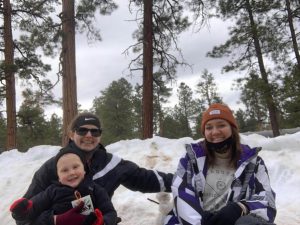Published: June 17, 2021

It wasn’t that long ago that LGBTQ+ military families were explicitly banned from serving in the military, and eventually only allowed to serve while closeted. In the 1940s, your sexual orientation and/or gender identity were seen as a mental illness, disqualifying you from service. As recently as 1982, military policy banned gay and lesbian individuals from serving. And in 1993, Congress enacted the widely-criticized “Don’t Ask, Don’t Tell” policy — which was meant to be a point of progress allowing LGBTQ+ individuals to serve, but required them to remain closeted.

It was almost 20 years before that policy was finally repealed in 2011, allowing gay, lesbian, and bisexual people to serve openly in the military. It took two more years for spousal and family benefits to be extended to same-sex families. Now, just this year, transgender individuals are receiving some protections, although they still face a number of ongoing battles for basic rights.
Why is it important to remember that history? As of 2018, 6.3% of service members identified as LGB.(1) Six percent might not sound like a big number, but when you consider that more than 1.4 million people are currently serving in either active-duty or guard and reserve positions, we’re talking about more than 84,000 people. 84,000 people who have made the commitment to serve our country and ensure American families’ safety and well-being at home and abroad. All military families, including those 84,000+ LGBTQ+ families, deserve our respect, our appreciation, and our support.
But we know cultural shifts take time. The policies may have changed, but has the environment? Jessi, an Air Force spouse and mom of a beautiful 4 year-old boy, has seen the

progress, but still has to navigate the unique challenges of being a LGBTQ+ military family. Some things may be subtle, but the impacts can be very detrimental to people’s overall well-being.
“We’ve really enjoyed being a part of the military community and we have met so many loving and amazing people along the way,” Jessi shared. “But I still often get asked the question, ‘What does
your husband do in the military?’ Correcting people on that can sometimes be stressful and is something that I often second-guess myself on. I have sometimes said ‘he’ in my response because I was scared of people’s reactions.”
Being scared of how people will react goes beyond simply answering a question in conversation or on a form. It also comes into play when approaching a permanent change of station (PCS). Moving to a new community brings up a lot of questions. Will I be able to find friends? Will I be able to find employment? Will my child have a school who accepts him or her and our family? Will my child be able to build important friendships? Will my community accept and welcome my family without reservations? The list could go on and on. Fear over acceptance and belonging is something that all military families struggle with.
In fact, we know from the 2020 Military Family Lifestyle Survey that, while half (49%) of active-duty military family respondents feel welcome in their local civilian community, only 35% say they can find people within their civilian community to relate to and less than a third (30%) report feeling supported by their community. For Jessi’s family, where they will move and concern over whether they will be welcomed is a source of a lot of stress.
“Where we will be sent is a huge and constant concern,” Jessi explained. “We know how it feels to not be accepted. The State we were living in at the time we got married didn’t recognize our marriage. The military did, but the State didn’t. When I tried to get a license with my married last name, they threatened to suspend my license so I had to keep my maiden name on my license until our marriage was finally recognized there. We have researched so much and so often about the different places we could go and where our family will be accepted, or better yet, celebrated.” While their current installation tried to be inclusive by hosting a pride activity, Jessi was disappointed to find hateful comments posted in response that were not taken down or addressed. Change and acceptance within the military community is still very much a work in progress, and as we know, when there’s stress at home, mission readiness suffers.

At the end of the day, Jessi and her family simply want to continue serving and be included in the military community. They are willing to make this incredible sacrifice — sacrificing time together, navigating frequent moves, and handling long work hours — all for the greater good of the country. It seems like a small ask in return to feel welcome to participate in the marriage programs available to same-sex couples, to see inclusive language on forms and in how people are addressed, and to feel confident that their child will have access to an open and accepting neighborhood in which to live and grow.
The mission of Blue Star Families is to create an environment in which all military families are able to thrive. We will do this by continuing to shine a light on families like Jessi’s; families who are vital to the military community and deserve to feel supported and appreciated each and every day.
We want to be there for your family, too. Become a member today and learn more about how Blue Star Families continues to support the military community through valuable programs and resources at www.bluestarfam.org/join.
Posted In:
